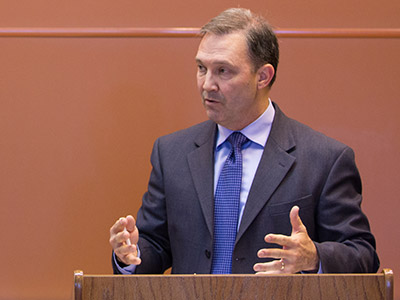Professor Jerome Creach Spends Sabbatical Writing about Psalms and imago Dei
We all learned to cope differently with the extended quarantine and social distancing of 2020. Some people took up home improvement projects, and others learned to bake sourdough bread. For the Rev. Dr. Jerome Creach, Pittsburgh Seminary’s Robert C. Holland Professor of Old Testament, the combination of quarantine and sabbatical allowed for three exciting academic projects—along with teaching summer Hebrew!
In October, Dr. Creach’s book about the Psalter was published, a compact introduction called Discovering Psalms: Content, Interpretation, Reception (Eerdmans, 2020). Over the centuries, many volumes have been written about the Psalms, but Dr. Creach’s contribution focuses on a vital component of interpretation often overlooked—reception history. That is, he explores how the Psalms have been received, used, and interpreted throughout history.
But Dr. Creach is not finished working with the Psalms! He is currently completing a commentary for Smyth & Helwys’ Reading the Old Testament series, likely to be called Reading the Psalms: A Literary and Theological Commentary. You can look for it this spring!
Now on a sabbatical, Dr. Creach has turned to a new and exciting project: a study of the theological concept of imago Dei that is rooted in Old Testament exegesis of the Genesis 1 passage from which it comes.
This doctrine—that humans are created in the image of God—has had an enormous influence on Christian theology, and yet only one book on the subject has been released in the last 30 years from the perspective of Old Testament scholarship.
This project is still developing, so Dr. Creach does not yet know all the directions it will take. But he is clearly energized by the possibilities. For instance, he wonders how the idea of imago Dei reverberates throughout the canon. The language in the Genesis 1 text indicates a royal designation—people would serve as representatives of the divine monarch—so how does this idea interact with the Old Testament’s critique of monarchy? Perhaps in an ancient Near Eastern world where kings were seen as the only true “sons of God,” this text delivered a subversive democratization by considering all people to be bearers of the divine image. This seems to at least be the passage’s effect on history; Thomas Paine, though himself a deist and critic of organized religion, used the imago Dei to argue against tyranny.
Dr. Creach is still excited about teaching, though it is on pause for his sabbatical. This summer, he taught Hebrew I and II online, and he was pleasantly surprised by the transition from classroom to video conference. In some ways, the learning experience has even been enhanced by the online format. In Old Testament classes, for instance, discussion forums bring every student into the conversation and give them ample time to process their thoughts. “Many times, the best learning occurs in the casual conversations before and after class. Students can ask whatever questions are on their mind. So, I miss that aspect of learning in person.”
When the sabbatical and—we pray—the pandemic are over, Dr. Creach is excited to return to campus and teach students face to face.

